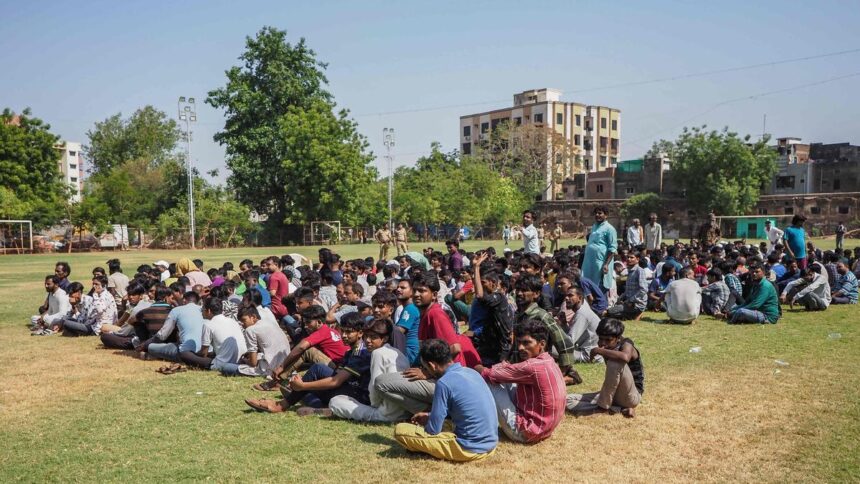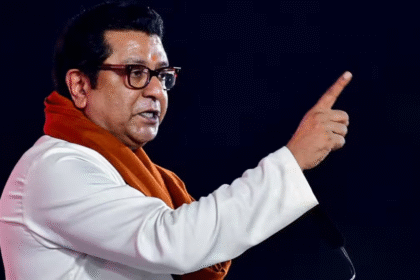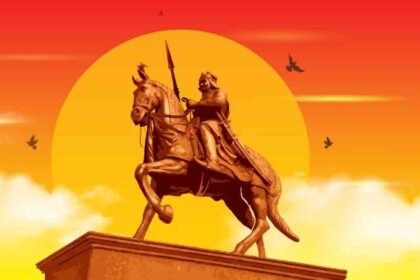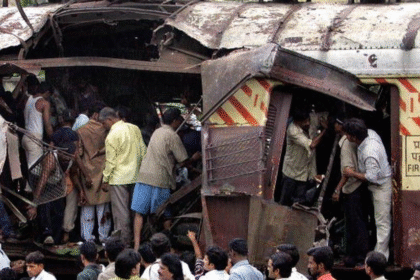“You Speak Bengali, So You’re Bangladeshi”: Muslim Families in NCR Face Harassment Over Language
New Delhi: “When you go to the temple, you must offer prasad,” says 54-year-old Sajan, a resident of J.J. Colony in Bawana, Delhi. But he isn’t speaking about religious devotion; for him, ‘offering prasad at the temple’ is a euphemism for being beaten and humiliated by the police.
The authorities are currently enforcing a crackdown against migrant families in and around Delhi on the suspicion that they are undocumented ‘Bangladeshi’ immigrants. Under this crackdown, low-income Bengali-speaking Muslim families of those like Sajan, who say they migrated to Delhi from West Bengal, Bihar and Jharkhand decades ago in search of work, are living under a cloud of fear.
A number of Muslim residents in Bawana’s J.J. Colony said the police harassed them and suspected they were undocumented immigrants from Bangladesh because they speak Bengali. This is despite the fact that they possess documents such as Aadhaar and PAN cards, voter ID, decades-old land titles and even Indian passports.
This crackdown isn’t merely a matter of document verification, they said, but a fight for their very existence.
They are being repeatedly summoned to the police station and subjected to harassment, families here allege.
In a small house in J.J. Colony’s E block, 28-year-old Shabnam and her family live in constant fear of the police. She says they are from Haripur village, in what is today Godda district in Jharkhand, and moved to Delhi decades ago, with J.J. Colony being their home for over 15 years.
Shabnam’s father is a daily wage labourer who also drives a rented rickshaw to make ends meet, while her mother is a domestic worker. She and her siblings were educated in Delhi and possess official documents to prove it, Shabnam says.
On the morning of July 5, Delhi police officers arrived at their home for a ‘verification’. They told Shabnam’s father to come to the station for an inquiry, assuring him he could ‘just sign the papers and go home immediately after’.

Speaking about this incident, Shabnam recalls: “Once we reached the police station, they started demanding money. They said, ‘Pay us and we will get the case closed’. When we refused, they became hostile.” The police, which had dragged her brothers, 12 and eight, into their vehicle, later came to their home at night, called her mother outside and shone a torch in her face, she alleges.
Shabnam adds: “We showed the police every Indian document we have of all our family members – voter IDs, Aadhaar cards, ration cards and land deeds, but they only had one response: ‘You speak Bengali, so you are Bangladeshi’. For us, this was the ultimate humiliation.
“Now, the police have taken my mother’s photo and circulated it to all police stations. Any police officer can show up at our home, show that photo and call my mother outside, shine a torch in her face late at night and interrogate her rudely. Because of this police brutality, we can’t sleep.”
For Shabnam’s family, their ordeal wasn’t limited to just a day. She says the police summoned them to the station and subjected them to harassment for three days until July 8.
Shabnam’s family is not alone. The police’s alleged tactics are a common thread in the stories of other residents too.
Sajan recounts a previous instance of police detention in which his citizenship was scrutinised where the assault was so severe it left him with a lasting injury. “The ones who took me before, they beat me so badly they tore my eardrum,” he says.
It appears that the harassment spares no one, not even 80-year-old Mohammad Zafar. When he presented his decades-old land papers from his village in Jharkhand as proof, he says the police rejected them. “The police looked at my papers and said, ‘These can also be made with money’,” suggesting that they were forged, he says.
Zafar alleges that he was then directly threatened with deportation. “The police told me, ‘You are lying. We will send you to Pakistan, we will send you to Bangladesh’.”
For both Zafar and Sajan, despite possessing documents including land papers and Aadhaar, PAN, ration and voting cards, the police’s conclusion was allegedly pre-determined, based on perceived Muslim identity rather than facts.
Several residents say the police show up repeatedly, detaining them for up to two or three days at a time under the pretext of an ‘inquiry’. Some also make the serious allegation that police officers confiscated their official documents such as their Aadhaar and voting cards during these inquiries and have not returned them yet.
Communist Party of India (Marxist) leader Brinda Karat wrote a letter to Union home minister Amit Shah on July 11 in which she raised the issue of the harassment of Bengali-speaking citizens during the identification of undocumented Bangladeshi immigrants.
Her letter mentioned incidents of human rights violations, including harassment, extortion and the forced deportation of genuine Indian citizens based on their identity.
“Bengali-speaking Muslims are specifically being targeted. This is a massive drive happening across the country under the leadership of home minister Amit Shah. The Delhi police, which is directly under the home ministry, is acting on the basis of patronage. They know that Shah is sitting there, that these are his directions, and the more they do, the more stars will be added to their uniforms. So this is the reality. This is a policy of the Union government..
Just like in J.J. Colony, in the Loni neighbourhood of Ghaziabad across Delhi’s border with Uttar Pradesh, six members of another Muslim family were arrested by the Delhi police on charges of being undocumented Bangladeshi immigrants.
Amjad Hussain and his family had been living in Loni for the last 15 years, where he ran a book printing business.

On the morning of July 9, the Delhi police arrived at Amjad’s home under the pretext of an inquiry. Officers subsequently took six people from the family into custody.
These included Ashraf Hussain (23), a 17-year-old girl, Fahmina Khatun (20) and Akram Hussain (24), along with Fahmina’s 18-month-old and eight-month-old children.
A relative of this family said on condition of anonymity that the police “took them on July 9 at around 7 am” on the grounds that they are Bangladeshis, but “I want to make it clear that they are not from Bangladesh. They are originally from the Madhubani district in Bihar and have been living here for the last 15 years.
“We showed the police all the documents, including PAN card, Aadhaar card, the children’s government school mark sheets and even a BA degree certificate.
“They are hardworking people. One is working as a delivery partner for Amazon, while the father is in the printing business. For many years, they have been living here and doing their work and business, but the Delhi police only told us this much: ‘No, they are Bangladeshis and they cannot live here’. They are now in a detention centre in Sarai Rohilla. We are in immense trouble because of this. They are Indian citizens and their entire family is in India. This is happening with us for the first time.”
Amjad’s home in Loni now stands locked and empty. Fearing further police action, he and his wife have fled.
Lawyer Aditya Agarwal confirmed that the “court has issued a notice on the protection petition and has sought a reply from the Foreigners Regional Registration Office and the Ministry of Home Affairs. The next date of hearing is set for August 14, 2025.”
Also Read: Iran Nuclear Talks With European Powers Intensify Amid Sanctions Threat








